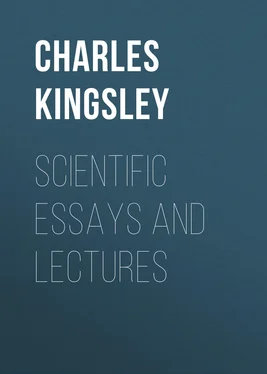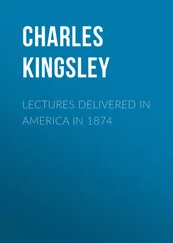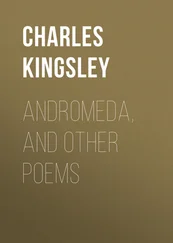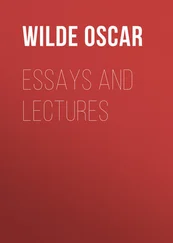Charles Kingsley - Scientific Essays and Lectures
Здесь есть возможность читать онлайн «Charles Kingsley - Scientific Essays and Lectures» — ознакомительный отрывок электронной книги совершенно бесплатно, а после прочтения отрывка купить полную версию. В некоторых случаях можно слушать аудио, скачать через торрент в формате fb2 и присутствует краткое содержание. Жанр: foreign_prose, foreign_antique, на английском языке. Описание произведения, (предисловие) а так же отзывы посетителей доступны на портале библиотеки ЛибКат.
- Название:Scientific Essays and Lectures
- Автор:
- Жанр:
- Год:неизвестен
- ISBN:нет данных
- Рейтинг книги:4 / 5. Голосов: 1
-
Избранное:Добавить в избранное
- Отзывы:
-
Ваша оценка:
- 80
- 1
- 2
- 3
- 4
- 5
Scientific Essays and Lectures: краткое содержание, описание и аннотация
Предлагаем к чтению аннотацию, описание, краткое содержание или предисловие (зависит от того, что написал сам автор книги «Scientific Essays and Lectures»). Если вы не нашли необходимую информацию о книге — напишите в комментариях, мы постараемся отыскать её.
Scientific Essays and Lectures — читать онлайн ознакомительный отрывок
Ниже представлен текст книги, разбитый по страницам. Система сохранения места последней прочитанной страницы, позволяет с удобством читать онлайн бесплатно книгу «Scientific Essays and Lectures», без необходимости каждый раз заново искать на чём Вы остановились. Поставьте закладку, и сможете в любой момент перейти на страницу, на которой закончили чтение.
Интервал:
Закладка:
Charles Kingsley
Scientific Essays and Lectures
ON BIO-GEOLOGY 1 1 An Address given to the Scientific Society of Winchester, 1871.
I am not sure that the subject of my address is rightly chosen. I am not sure that I ought not to have postponed a question of mere natural history, to speak to you as scientific men, on the questions of life and death, which have been forced upon us by the awful warning of an illustrious personage’s illness; of preventible disease, its frightful prevalency; of the 200,000 persons who are said to have died of fever alone since the Prince Consort’s death, ten years ago; of the remedies; of drainage; of sewage disinfection and utilisation; and of the assistance which you, as a body of scientific men, can give to any effort towards saving the lives and health of our fellow-citizens from those unseen poisons which lurk like wild beasts couched in the jungle, ready to spring at any moment on the unsuspecting, the innocent, the helpless. Of all this I longed to speak; but I thought it best only to hint at it, and leave the question to your common sense and your humanity; taking for granted that your minds, like the minds of all right-minded Englishmen, have been of late painfully awakened to its importance. It seemed to me almost an impertinence to say more in a city of whose local circumstances I know little or nothing. As an old sanitary reformer, practical, as well as theoretical, I am but too well aware of the difficulties which beset any complete scheme of drainage, especially in an ancient city like this; where men are paying the penalty of their predecessors’ ignorance; and dwelling, whether they choose or not, over fifteen centuries of accumulated dirt.
And, therefore, taking for granted that there is energy and intellect enough in Winchester to conquer these difficulties in due time, I go on to ask you to consider, for a time, a subject which is growing more and more important and interesting, a subject the study of which will do much towards raising the field naturalist from a mere collector of specimens—as he was twenty years ago—to a philosopher elucidating some of the grandest problems. I mean the infant science of Bio-geology—the science which treats of the distribution of plants and animals over the globe, and the cause of that distribution.
I doubt not that there are many here who know far more about the subject than I; who are far better read than I am in the works of Forbes, Darwin, Wallace, Hooker, Moritz Wagner, and the other illustrious men who have written on it. But I may, perhaps, give a few hints which will be of use to the younger members of this Society, and will point out to them how to get a new relish for the pursuit of field science.
Bio-geology, then, begins with asking every plant or animal you meet, large or small, not merely—What is your name? That is the collector and classifier’s duty; and a most necessary duty it is, and one to be performed with the most conscientious patience and accuracy, so that a sound foundation may be built for future speculations. But young naturalists should act not merely as Nature’s registrars and census-takers, but as her policemen and gamekeepers; and ask everything they meet—How did you get there? By what road did you come? What was your last place of abode? And now you are here, how do you get your living? Are you and your children thriving, like decent people who can take care of themselves, or growing pauperised and degraded, and dying out? Not that we have a fear of your becoming a dangerous class. Madame Nature allows no dangerous classes, in the modern sense. She has, doubtless for some wise reason, no mercy for the weak. She rewards each organism according to its works; and if anything grows too weak or stupid to take care of itself, she gives it its due deserts by letting it die and disappear. So, you plant or you animal, are you among the strong, the successful, the multiplying, the colonising? Or are you among the weak, the failing, the dwindling, the doomed?
These questions may seem somewhat rude: but you may comfort yourself by the thought that plants and animals, though they deserve all kindness, all admiration, deserve no courtesy—at least in this respect. For they are, one and all, wherever you find them, vagrants and landlopers, intruders and conquerors, who have got where they happen to be simply by the law of the strongest—generally not without a little robbery and murder. They have no right save that of possession; the same by which the puffin turns out the old rabbits, eats the young ones, and then lays her eggs in the rabbit-burrow—simply because she can.
Now, you will see at once that such a course of questioning will call out a great many curious and interesting answers, if you can only get the things to tell you their story; as you always may if you will cross-examine them long enough; and will lead you into many subjects beside mere botany or entomology. So various, indeed, are the subjects which you will thus start, that I can only hint at them now in the most cursory fashion.
At the outset you will soon find yourself involved in chemical and meteorological questions; as, for instance, when you ask—How is it that I find one flora on the sea-shore, another on the sandstone, another on the chalk, and another on the peat-making gravelly strata? The usual answer would be, I presume—if we could work it out by twenty years’ experiment, such as Mr. Lawes, of Rothampsted, has been making on the growth of grasses and leguminous plants in different soils and under different manures—the usual answer, I say, would be—Because we plants want such and such mineral constituents in our woody fibre; again, because we want a certain amount of moisture at a certain period of the year: or, perhaps, simply because the mechanical arrangement of the particles of a certain soil happens to suit the shape of our roots and of their stomata. Sometimes you will get an answer quickly enough; sometimes not. If you ask, for instance, Asplenium viride how it contrives to grow plentifully in the Craven of Yorkshire down to 600 or 800 feet above the sea, while in Snowdon it dislikes growing lower than 2000 feet, and is not plentiful even there?—it will reply—Because in the Craven I can get as much carbonic acid as I want from the decomposing limestone; while on the Snowdon Silurian I get very little; and I have to make it up by clinging to the mountain tops, for the sake of the greater rainfall. But if you ask Polypodium calcareum —How is it you choose only to grow on limestone, while Polypodium Dryopteris , of which, I suspect, you are only a variety, is ready to grow anywhere?— Polypodium calcareum will refuse, as yet, to answer a word.
Again—I can only give you the merest string of hints—you will find in your questionings that many plants and animals have no reason at all to show why they should be in one place and not in another, save the very sound reason for the latter which was suggested to me once by a great naturalist. I was asking—Why don’t I find such and such a species in my parish, while it is plentiful a few miles off in exactly the same soil?—and he answered—For the same reason that you are not in America. Because you have not got there. Which answer threw to me a flood of light on this whole science. Things are often where they are, simply because they happen to have got there, and not elsewhere. But they must have got there by some means, and those means I want young naturalists to discover; at least, to guess at.
A species, for instance—and I suspect it is a common case with insects—may abound in a single spot, simply because, long years ago, a single brood of eggs happened to hatch at a time when eggs of other species, who would have competed against them for food, did not hatch; and they may remain confined to that spot, though there is plenty of food for them outside it, simply because they do not increase fast enough to require to spread out in search of more food. Thus I should explain a case which I heard of lately of Anthocera trifolii , abundant for years in one corner of a certain field, and only there; while there was just as much trefoil all round for its larvæ as there was in the selected spot. I can, I say, only give hints: but they will suffice, I hope, to show the path of thought into which I want young naturalists to turn their minds.
Читать дальшеИнтервал:
Закладка:
Похожие книги на «Scientific Essays and Lectures»
Представляем Вашему вниманию похожие книги на «Scientific Essays and Lectures» списком для выбора. Мы отобрали схожую по названию и смыслу литературу в надежде предоставить читателям больше вариантов отыскать новые, интересные, ещё непрочитанные произведения.
Обсуждение, отзывы о книге «Scientific Essays and Lectures» и просто собственные мнения читателей. Оставьте ваши комментарии, напишите, что Вы думаете о произведении, его смысле или главных героях. Укажите что конкретно понравилось, а что нет, и почему Вы так считаете.












